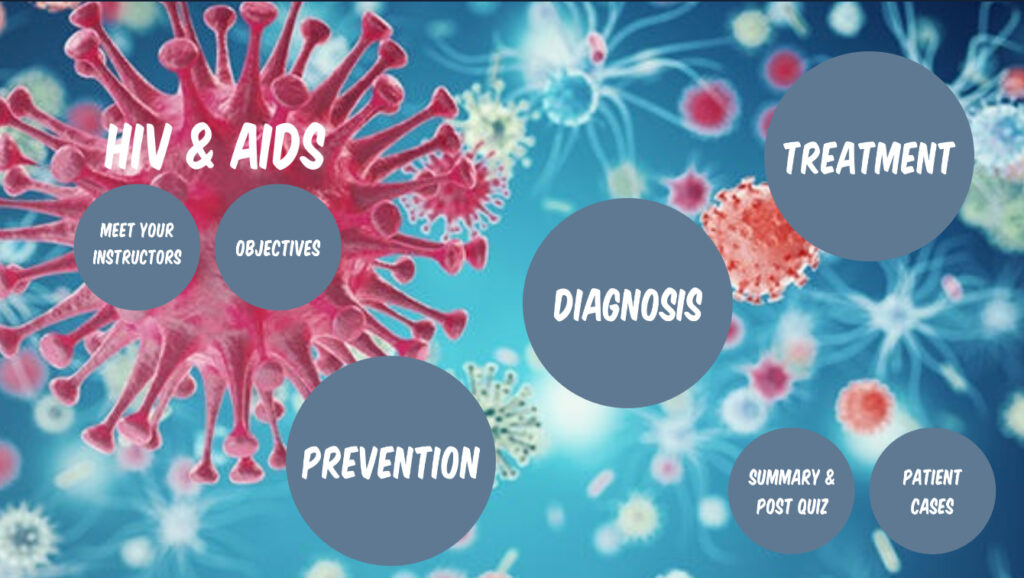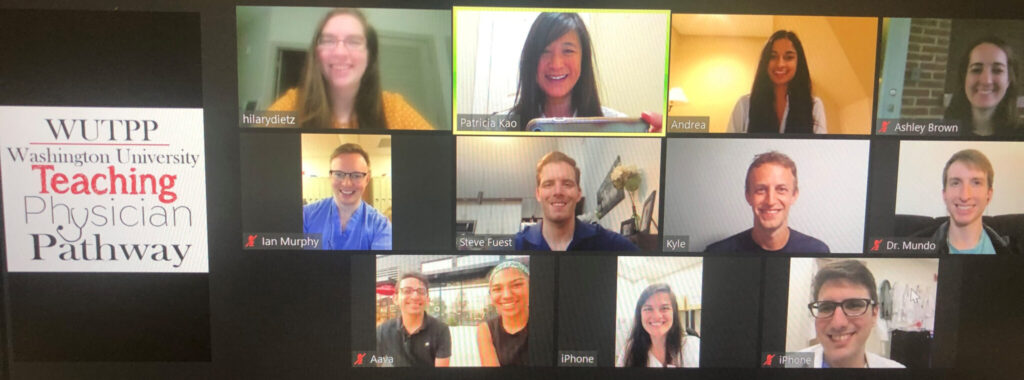Embedded within the Internal Medicine Residency Program are a variety of educational pathways where residents can specialize their skills. For residents who wish to explore teaching as a possible career path, the Washington University Teaching Physician Pathway (WUTPP) provides opportunities for growth and development as a clinician-educator. One component of the WUTTP program involves pairing residents with a faculty mentor to provide didactic teaching for 3rd year medical students. Under normal circumstances, residents hone these teaching skills in a traditional classroom setting. But, when the COVID pandemic hit, WUTTP residents were faced with a crash course in translating their teaching skills to a virtual environment.
The WUTTP program has successfully provided residents with teaching opportunities since 2016. As WUTPP Director, Patricia Kao, MD, MS, Associate Professor in the Division of Nephrology, designed the initial curriculum and continues to lead the program today. Over the years, Kao, as a Carol B. and Jerome T. Loeb Teaching Fellow, utilized her Loeb fellowship to further refine the WUTPP curriculum with additional programmatic development and increased collaboration with undergraduate medical school course directors.
In early 2018, Kao, fueled by her interest in developing a mentorship component to WUTPP, connected with Gerome Escota, MD, Assistant Professor of Medicine and the newly appointed Clerkship Director in Medicine at the time. “I was looking for opportunities for residents to get experience with curriculum design and presentation skills,” Kao recalls. “Dr. Escota and the core clerkship program had 12 sessions, I had 12 residents at the time. It seemed like the perfect way to combine our goals for faculty to mentor teaching residents and for teaching residents to get practice developing new sessions.” Escota likewise thought the idea of partnering residents with faculty was a unique opportunity to innovate the core clerkship for medical students. “The collaboration has been going strong now for over two years,” commented Escota. “Our student feedback since incorporating the WUTTP residents is overwhelmingly positive.”
Fast forward to March 2020, when the core clerkship program paused due to the pandemic. When Kao learned that they were going to restart with all online learning, she had to prep the WUTTP residents to deliver their didactic curriculum virtually. “With just three weeks, our residents created virtual modules for the medical students to do online learning at home as part of the clerkship,” said Kao. “Students then followed these modules with scheduled Zoom time with a faculty member for review and more in-depth questions.”
The residents designed the online modules at home or during downtime from their clinical duties, utilizing readily-available free software. “The multi-media modules they created are high-yield, interactive, in-depth didactic materials complete with short, pre-recorded videos, quizzes and discussion cases,” commented Kao. Many of the residents used a common, cloud-based learning platform called Talent LMS, but all were free to choose whatever software they were most comfortable with. “I was amazed at how the residents and their faculty mentors embraced this,” reflected Kao. “It was truly a win-win. The faculty served as content experts, and the WUTTP residents were more of the curriculum design experts.”

For the residents, the abrupt turn to online learning had some unanticipated positives as well. “COVID occurred and we had to find a new way to provide the core clerkship students with the content we had been teaching previously in person,” commented Steve Fuest, MD, recent WUTTP resident. “The online modules gave us the opportunity to be more creative and try some new things that will be helpful for students in the future.”
For Aava Khatiwada, MD, also a recent WUTTP resident, the modules enhanced a flipped classroom model approach. “They really can fit into a more modern approach to learning,” recommended Khatiwada. “It is more learner-centered and provides flexibility – allowing students to get the education they need on their own time.”
Overall, the necessary virtual pivot for WUTTP was an unexpected bonus under unprecedented circumstances. Escota is pleased with how WUTTP has enhanced the core clerkship over the years, providing these virtual platforms and potential for future innovation. “The collaboration has provided more engaged and active learning for the students,” Escota shared. “I encourage other clerkship programs to explore involving residents in mentorship teaching. It can be truly transformative.”
